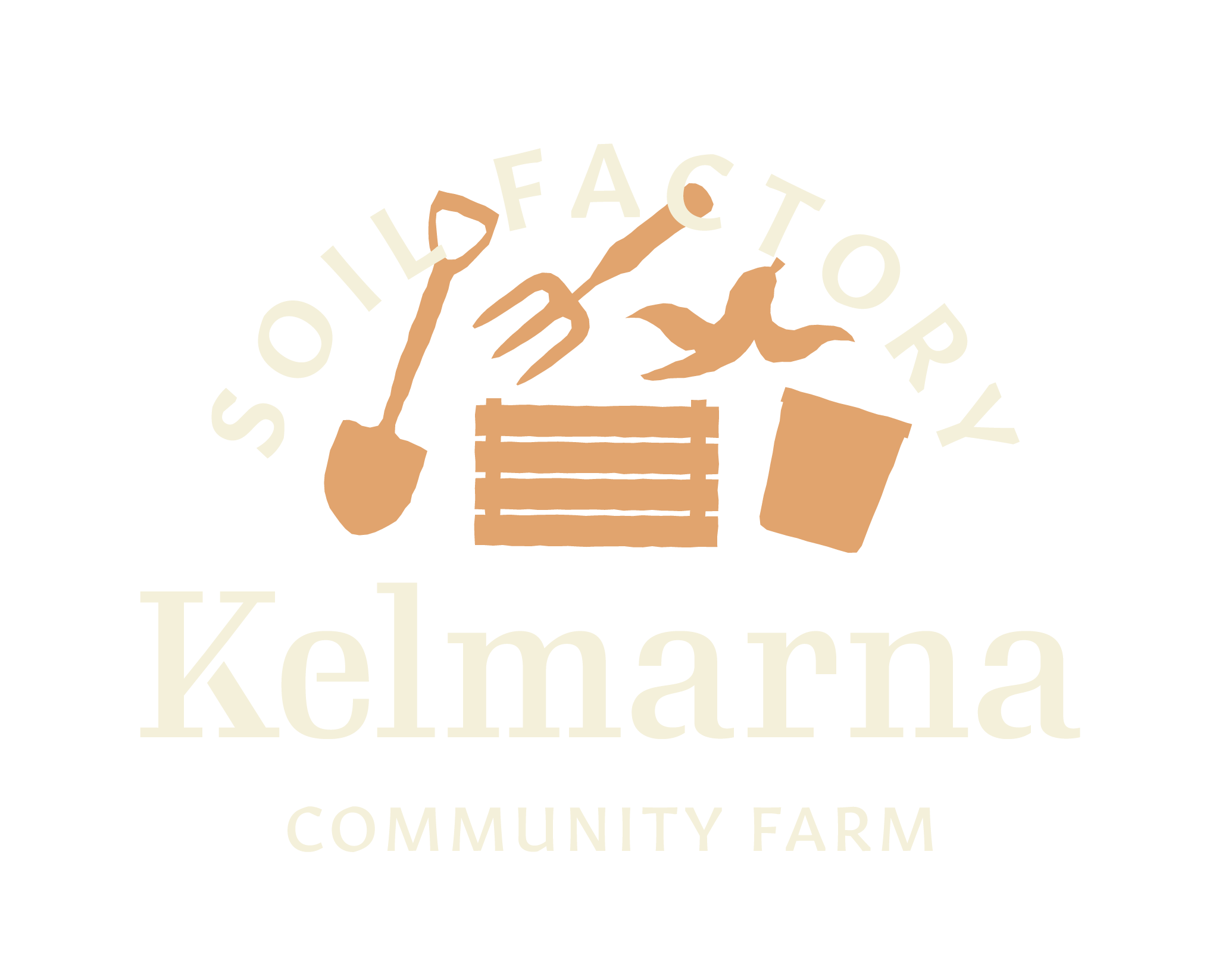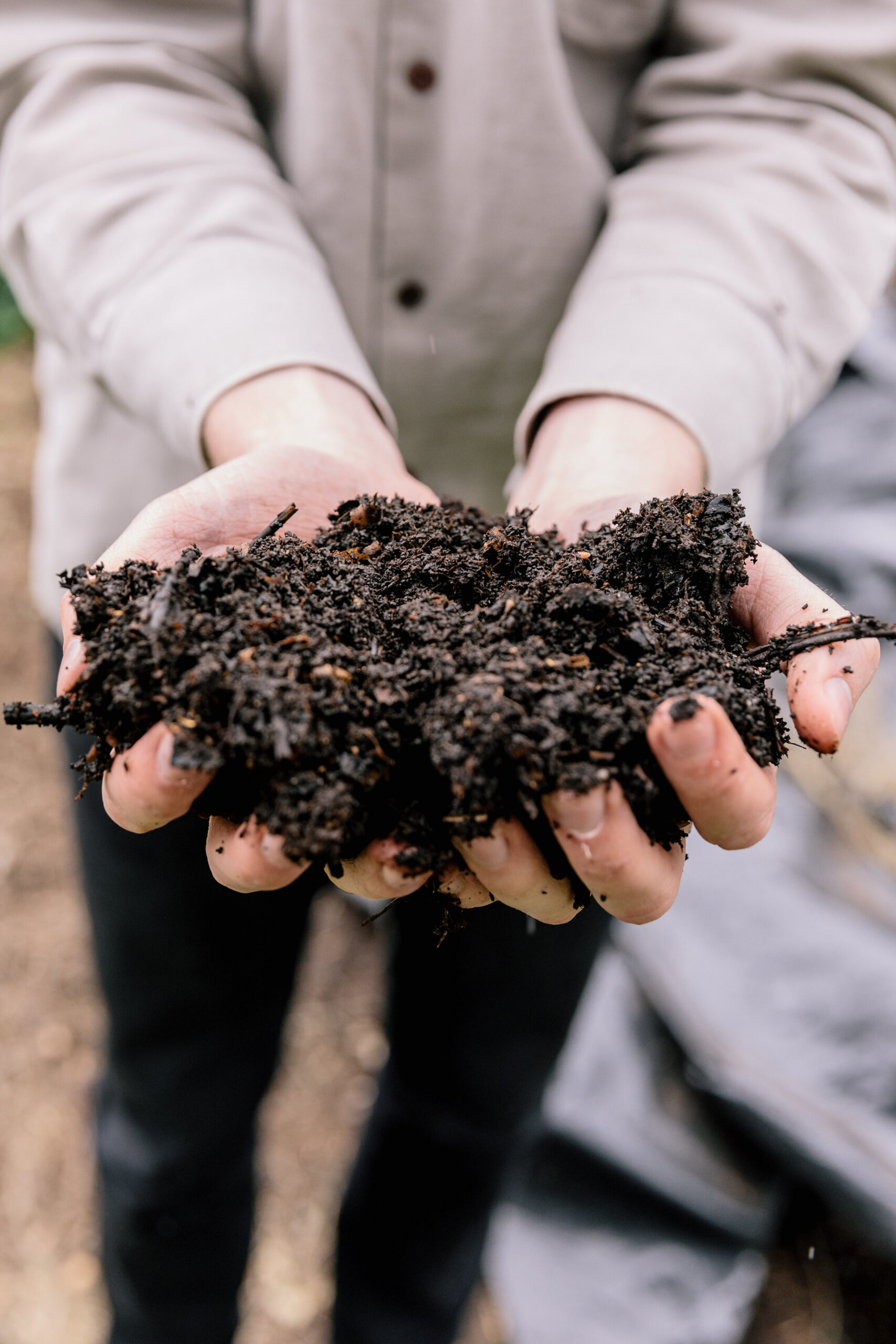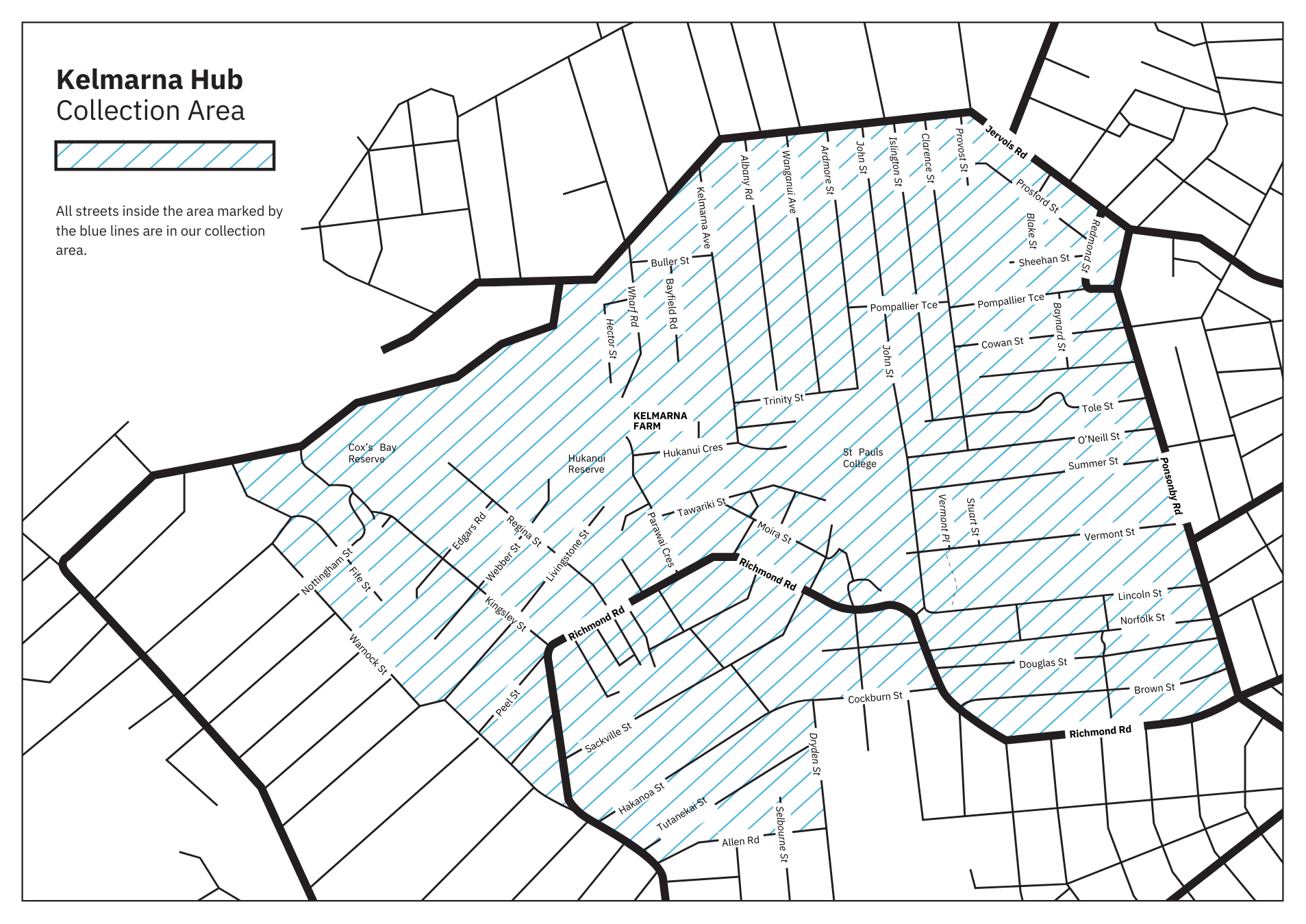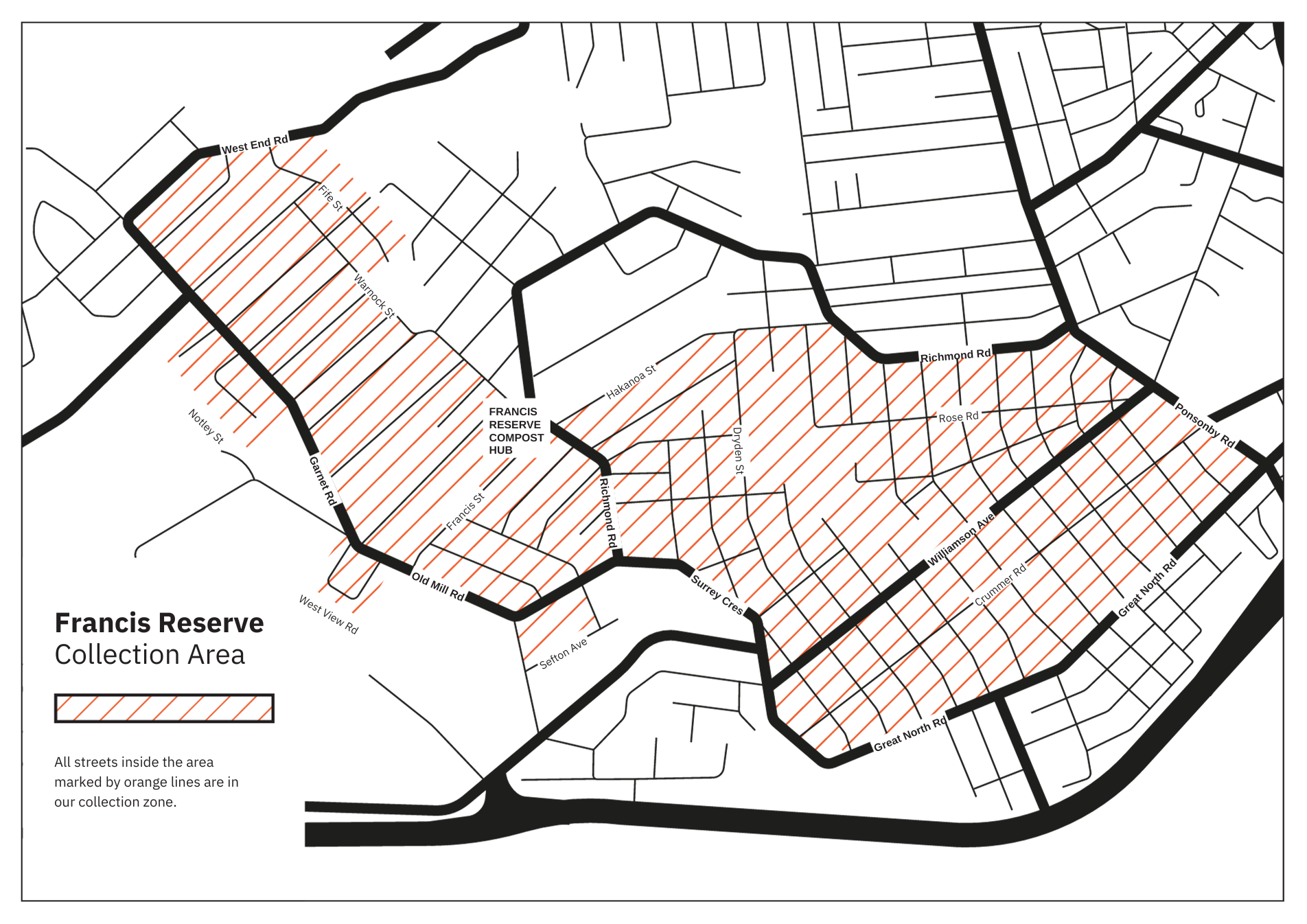
Bike-powered community composting
We provide a local solution for your food scraps, turning them into living compost which helps grow more food at our urban community farm.
117
Households and businesses helping us build soil
86,414
Litres of Food scraps collected and turned into compost
61,896
Litres Other organic materials rescued and composted
Find out how it works
1. JOIN SOIL FACTORY AS A CUSTOMER
Our short sign up process helps us to understand what your household or business needs, and get you set up and ready to go. You pay monthly for your Soil Factory subscription, and we provide a weekly service.
2. YOU SEPARATE YOUR SOIL INGREDIENTS INTO YOUR BUCKET.
When you sign up, we provide you with one or more of our 20 litre buckets with lids, for you to put your food scraps in. Check out our Soil Ingredients list to find out what you can and can’t put in your bucket.
3. THE INGREDIENTS COME TO ONE OF OUR SOIL FACTORY COMPOST HUBS.
We have two compost hubs, one located in Kelmarna Community Farm known as the Kelmarna Compost Hub and the other in Francis Reserve known as the Francis Reserve Compost Hub. Weekly we jump on our e-bike, hitch on the trailer, and whizz round the neighbourhood emptying all the buckets for our collection customers. By collecting on bike, and composting your scraps locally, we aim to reduce the emissions normally generating by collecting and trucking our food scraps out of town, and replace this with local, sustainable, resilient solutions. We collect on Fridays for our Kelmarna Compost Hub and on Wednesdays for our Francis Reserve Compost Hub Check out our collection area here. Drop off customers bring their buckets to Kelmarna, empty and rinse your bucket, and make a note of your drop-off for our records. You can drop off any day of the week, including out of hours.
4. WE MAKE BEAUTIFUL COMPOST.
After arriving to our compost hubs, food scraps are mixed with other materials and hot composted using the CarbonCycle Composter system, which has been specifically designed in Auckland for the purposes of community-scale food composting. Our composting process also makes good use of other organic by-products and resources from local arborists, lawnmowers, coffee roasters, and furniture makers, returning all this nutrition to food production and saving it from being wasted.
5. WE RETURN THE COMPOST TO THE SOIL TO HELP US GROW MORE FOOD!
Our finished compost feeds the soil at Kelmarna Community Farm to grow more local, organic food, creating a self-contained food system in our neighbourhood, and building healthy soils capable of sequestering carbon from the atmosphere. Soil Factory’s proceeds also fund Kelmarna’s work to connect people with nature and food growing, and support people with experience of mental illness and intellectual disability to garden for therapy.
What it costs
Residential rates:
Bike collection: $35/month, + $25 per extra bucket
Drop-off: $17.50/month, + $15 per extra bucket
Bokashi bucket drop-off: $5/bucket (pay as you throw)
Business rates:
Bike collection: $60 + GST/month, + $20 per extra bucket
Drop-off: $30 + GST/month, + $10 per extra bucket
“Soil Factory’s proceeds support the wider Kelmarna Community Farm’s mission to create a better food future and more connected communities.”

Why Compost
By utilising our community’s food scraps we are converting a “waste” problem into a valuable resource that has significant benefits for our food security, soil health, and in mitigating climate change.
Compost builds the fertility of our soils, allowing us to grow nutrient-dense organic food that is naturally strong and resistant to pests, without the use of artificial fertilisers or pesticides. Compost also adds important structure to our soil, increasing water retention, reducing erosion, and allowing plants to sequester carbon from the atmosphere and store it in the soil.
Our aims are that Soil Factory is able to operate as a social enterprise model which covers its own costs while contributing to the development of local regenerative food systems
Locations
KELMARNA COMPOST HUB
Soil Factory’s Kelmarna Compost Hub is nestled in Kelmarna Community Farm, a community city farm where our compost is used to grow more nutrient dense and delicious organic vegetables.
Our collection zone is highlighted in blue markings on our map and spans from the borders of Herne Bay across Grey Lynn and into regions of Ponsonby. We collect weekly on Friday mornings between 6:30am – 3pm.
If you’re outside of our collection zone, or would like to visit the farm while dropping off your scraps there is also an option to sign up to drop-off your compostables at any time with a drop-off point at Kelmarna Community Farm.
FRANCIS RESERVE COMPOST HUB
Francis Reserve Compost Hub is located in Francis Reserve, neighbouring the Auckland Women’s Centre. This hub is collaborative project with Grey Lynn 2030 and made possible with funding through the Waitematā Local Board.
Our collection zone is highlighted in orange markings on our map and spans from Westmere across Grey Lynn and into regions of Arch Hill. We collect weekly on Wednesday mornings between 6:30am – 3pm.
If you’re outside of our collection zone, or live a walking distance from the reserve there is also an option to sign up to drop-off your compostables at any time with a drop-off point at Francis Reserve
KEEN TO GET STARTED – fill in the form below and we’ll get you composting in no time!
Frequently asked questions
How it all works?
What can I put in my bucket?
Thanks to the high temperatures and rat-proof design of our CarbonCycle Company composting bins, we can compost most of your kitchen scraps, including things that you generally wouldn’t compost at home.
What does Soil Factory cost?
We have different rates for households and businesses, and it depends on how much food waste you have, and whether it’s a collection or drop-off service – get in touch if you’d like us to provide a quote for your needs.
We offer a two-week free trial for all business customers, to help us to assess your needs and for you to see how the service will work for you.
I don’t know how many buckets I need, is this a problem?
Nope. You can always add more buckets if you need, or return some if you don’t need them, and we’ll adjust your rate accordingly. For businesses, we offer a two-week free trial while we assess your needs and you see how the service works for you.
How do you compost our scraps?
We use the CarbonCycle Company hot composting system, designed in Auckland for the purpose of community-scale composting. Food scraps are mixed with other organic by-products and resources that we source from local businesses, including woodchip, wood shavings, sawdust, coffee chaff, coffee grounds, grass clippings, cardboard and more. If you are looking to dispose of any of these materials, or similar dry compostable materials, feel free to get in touch.
What happens to the finished compost?
The finished compost is returned to the soil at Kelmarna, adding fertility and structure to our vegetable beds, and helping us to grow more local, organic food, and run our educational and therapeutic programmes.
In future, if we produce a surplus of compost we will look to make it available to our members and the public.
Can I line my bucket with something to make it easier to wash out?
You are welcome to line your bucket with newspaper, or alternatively use a certified compostable bin liner, which must be certified to Australian Standard AS4736-2006 or European Standard EN13432-2000. If you’re unsure which compostable liners you can use, please ask us first!
What is bokashi?
Bokashi composting is an anaerobic process that relies on the addition of material inoculated with beneficial microbes to ferment kitchen scraps. The compaction and fermentation of the material means that you don’t need to empty your bin as often, and the material that you provide us with is already partially processed.
You can find out more about bokashi on the Compost Collective site, or by attending one of their free composting workshops around Auckland, where you can also receive a discount off the purchase of a bokashi system.
Where do you collect?
We have two collection zones for our Kelmarna Compost Hub and Francis Reserve Compost Hub which covers parts of Ponsonby, Arch Hill, Westmere and Grey Lynn. Check out our map to see if you’re in the zone. For business customers, we can sometimes collect a little beyond the edges of the zone – feel free to get in touch and we’ll see what we can do.
When do you collect?
Kelmarna Compost Hub: Every Friday, between 6.30am and 3pm.
Francis Reserve Compost Hub: Every Wednesday, between 6.30am and 3pm.
When can I drop off my bucket?
You can drop off your bucket any day of the week, including out-of-hours, at your designated drop-off point (either Kelmarna Compost Hub or Francis Reserve Compost Hub).
Do I have to drop off my bucket every week?
Yes, even if your bucket isn’t totally full, you’ll need to bring it in to empty every week. Food scraps kept for more than a week are likely to start to putrefy – which means slimy, smelly food that is bad news for everyone.
Why we’re doing this
What happens to food material in landfill?
When buried in landfill, organic matter like food scraps breaks down anaerobically (without oxygen), releasing methane (a greenhouse gas 25 times more potent than carbon dioxide), and toxic leachate. Additionally, all this biomass and future fertility is lost from our food system.
We use a kitchen food disposal system (e.g. InSinkErator), is this better than landfill?
Food disposal units grind your food scraps up and add them to the wastewater system. While a substantial proportion of food material is water (InSinkErator estimate 70%), the remaining 30% of solids then has to be screened out from the wastewater system, and then ends up in landfill.
How does composting help to combat climate change?
Composting helps up to reduce climate change in two main ways.
- Reduced emissions – By composting locally, and collecting by bike, we are reducing the carbon emissions that would normally be generated by trucking food scraps out of the city, and by keeping organic material out of landfills, we are avoiding the methane that would normally be released – when it comes to trapping heat in our atmosphere, methane is estimated to be 25 times more effective than carbon dioxide.
- Carbon sequestration – Climate change is caused by an imbalance in the carbon cycle – we have upset the balance by burning fossil fuels, destroying the biosphere (through deforestation and more), and releasing carbon from our soils by over-tilling and the use of chemical fertilisers and pesticides, placing too much carbon in our atmosphere and our oceans.
Plants pull carbon dioxide from the air through photosynthesis and transfer a portion of the carbon to the soil through their roots. Soil microorganisms then turn the carbon into a stable form commonly known as humus. Compost plays a vital role in creating the conditions for plants to do this. Watch this short video from Kiss the Ground for a great brief explanation.
What about soil degradation?
Degradation of our soils is mainly caused by over-tilling and chemical-heavy farming (amongst other causes), and poses a threat to our future as serious and urgent as climate change. According to the UNFAO, if we continue to degrade our soils at current rates, we have only 60 years of harvests left globally, and in many places it is much less than that.
Used alongside other regenerative practices composting is a powerful tool to help us to prevent further erosion and to create new topsoil.
Other questions
Is Soil Factory a business?
Soil Factory is operated as a social enterprise by Kelmarna Community Farm. This means that we operate like a business, providing services in exchange for payment, but we are a purpose-driven, non-profit organisation. Any profits generated by Soil Factory fund Kelmarna Community Farms’ work to connect people with nature and food growing, and support people with experience of mental illness and intellectual disability to garden for therapy.
I want to compost at home but I’m not sure how to start.
Composting at home is often the best solution, and a great way to return fertility to your own garden. Compost Collective run excellent free workshops across Auckland where you can learn how to get started, or get help with resolving any problems you’ve had. We’re always happy to chat compost too if you’re struggling.


